
Detecting cervical spondylosis using deep learning
Read More...The effects of image manipulation on classification of cervical spondylosis X-ray images using deep learning
Investigating toxicity and antimicrobial properties of silver nanoparticles in Escherichia coli and Drosophila melanogaster

This paper looks at the antibacterial and toxic effects of silver nanoparticles (AgNPs) on Escherichia coli bacteria and Drosophila melanogaster fruit flies. They modified the AgNPs size, concentration, and surface coating to determine the effects on each of the organisms. For both organisms, increased AgNP concentration demonstrated increased toxicity but particle size and surface coating had opposing effects.
Read More...Drought prediction in the Midwestern United States using deep learning

The authors studied the ability of deep learning models to predict droughts in the midwestern United States.
Read More...Predicting clogs in water pipelines using sound sensors and machine learning linear regression

The authors looked the ability of sound sensors to predict clogged pipes when the sound intensity data is run through a machine learning algorithm.
Read More...Examination of the rotation curve for the dark matter deficient relic galaxy NGC 1277

The authors re-examine the galactic kinematics of relic galaxy NGC 1277, recently identified as dark matter deficient, by reproducing its rotation curve with data from the George and Cynthia Mitchell Spectrograph.
Read More...Predicting the spread speed of red imported fire ants under different temperature conditions in China

The authors looked at non-natural factors that influenced the spread rate of fire ants in multiple cities in China.
Read More...Study of neural network parameters in detecting heart disease

The authors looked at the ability to detect heart disease before the onset of severe clinical symptoms.
Read More...Predicting and explaining illicit financial flows in developing countries: A machine learning approach

The authors looked at the ability of different machine learning algorithms to predict the level of financial corruption in different countries.
Read More...Environmental contributors of asthma via explainable AI: Green spaces, climate, traffic & air quality

This study explored how green spaces, climate, traffic, and air quality (GCTA) collectively influence asthma-related emergency department visits in the U.S using machine learning models and explainable AI.
Read More...Identifying anxiety and burnout from students facial expressions and demographics using machine learning

The authors used machine learning to predict the presence of anxiety and burnout in students based on facial expressions and demographic information.
Read More...